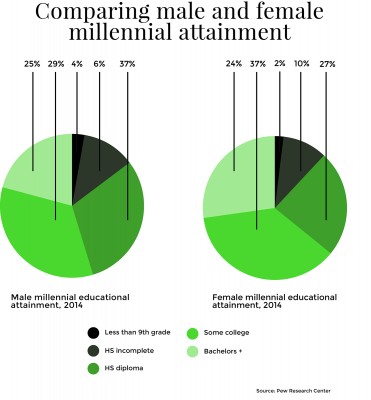
Although more millennials are attending college, a fewer percentage of millennials are obtaining bachelor’s degrees compared to their Generation X counterparts, according to a Thursday survey by the Pew Research Center.
The data, which compared demographic factors across generations, found that the percentage of millennials who received “some college” education has risen about 9 percent for males and females compared to Generation X while the percent of those who have earned bachelor’s degrees has decreased by about 11 percent.
Hardin Coleman, dean of the School of Education at Boston University, said there are several factors that may explain the changes in college degree attainment for millennials.
“First, there is a growth in family-supporting jobs with career ladders that do not need a degree to get and keep. Second, the expense of higher education is making it difficult to complete the degree. Third, there is a growth in college options to which students go and find that [the alternative programs] do not fit their needs or serve them well,” he wrote in an email.
Allen Harbaugh, a professor of educational leadership in SED, said the popularity of alternative colleges, online education and vocational training may account for why more millennials fall into the “some college” category of the study.
“Many entering the workforce through these avenues are likely to not obtain a BA,” he wrote in an email. “There are both positive and negative impacts. Briefly, it may limit the potential for millennials to obtain higher paying jobs, but it also may mean that the future cohort of adult workers will have less student loans.”
Harbaugh said Americans often link a degree to a better-paying job and there is an assumption that higher education “correlates with higher incomes and a better chance for upward social mobility.”
Linda Nathan, a senior lecturer and faculty director in SED, said the financial status of students makes it problematic to achieve a degree.
“Certainly, in my experience as a high school principal, it has been very difficult to watch my high school students not be able to finish college because of issues related to debt and the price of college,” she said.
Robert Weintraub, a research professor in SED, said it is worth noting that the survey showed that more women are gaining access to higher-level education than men.
“I believe that is a reflection of the powerful women’s movement that really began back in the 1970’s,” he wrote in email. “There is an over 20 [percent] increase in women’s achievement from the Silents to the millennials and Xers. With the workforce demanding more education, women are better prepared for the 21st century economy than men are.”
Despite this positive trend, Weintraub said there are still many people who do not have college degrees.
“The fact that even today, over 40 [percent] of men and around 35 [percent] of women do not have any higher education is a huge problem,” he said. “For the most part, these folks are not well prepared to survive, let alone thrive in the 21st century economy.”
Coleman said Pew’s findings could influence American schools to help students make better choices about their education in the future.
“I hope that it gets us to do a better job of helping high school students make post-secondary plans that set them on the path to success in life,” he said. “For some, that will be a four-year college right away. For some, it will be technical training. For some, it will be a gap year followed by college or other career exploration.”
Several students said the trend is occurring because of a combination of rising college tuition and a societal pressure to attend some kind of college.
“It might be happening because now everybody thinks they have to go to college, [and] they go even when they’re not ready, or maybe it’s not right for them,” said Rae Lynch, a sophomore in the College of Arts and Sciences.
Michael Janson, a sophomore in the College of General Studies, said the data did not surprise him because of the pressure for students to attend college.
“Percentage-wise, everyone is encouraged to go, but they don’t necessarily want to finish,” he said.
Maria Tata, a freshman in CAS, said having a college degree has become an expectation tied with the prospects of obtaining a job.
“It seems like everyone I know and where I’m from, everyone goes to college and everyone graduates,” she said. “It’s just what we’re taught when we start going to school … I just had no idea that so many people weren’t graduating with degrees. I bet that the price is responsible for it. This is going to affect jobs. I mean, you’re not going to give a job on Wall Street to someone who didn’t finish and doesn’t have a degree.”























































































































